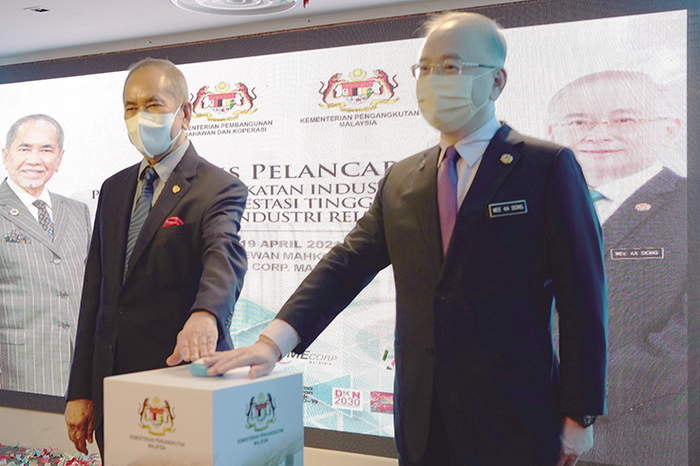The programme aims to identify and enhance the capacity of high-growth SMEs in the sector in line with DPN 2019-2030
by HARIZAH KAMEL / pic by ARIF KARTONO
THE government targets to increase the percentage of local contents by at least 45% from 20% in several components in the rail industry by 2030. The target will be facilitated through the Rail Industry Development Programme (RIDP), organised by the Entrepreneur Development and Cooperatives Ministry (Medac) through SME Corp Malaysia and the Transport Ministry via the National Rail Centre of Excellence (NRCOE) and Technology Depository Agency Bhd (TDA).
The programme aims to identify and enhance the capacity of high-growth small and medium enterprises (SMEs) in the rail sector in line with the National Transport Policy 2019-2030 (DPN 2019-2030) and the National Entrepreneurship Policy 2030 (DKN 2030). Transport Minister Datuk Seri Dr Wee Ka Siong (picture; right) said the NRCOE will act as a coordinating centre at the national level to ensure the development of local professionals, skilled and semi-skilled talent in the rail field, and improve standards and quality assurance for the rail industry. “It will also coordinate rail technology studies in line with DPN 2019-2030 and industry needs.
“Under this programme, companies will be guided to increase capacity and marketability, and further increase the percentage of local contents by at least 45% in several components that have been identified by 2030,” he said in a press conference yesterday. Wee added that the programme will be able to reduce Malaysia’s dependence on suppliers or original equipment manufacturers (OEMs) from overseas, simultaneously reducing financial flows abroad.
Medac Minister Datuk Seri Dr Wan Junaidi Tuanku Jaafar (left) said the rail industry has been identified under DKN 2030 in driving the establishment of innovation-based and high-growth SMEs.
The industry contributed RM43.05 billion to the national economy to date and is expected to need approximately 50,000 skilled workers by 2030.
“Selected SMEs under this programme will go through capacity-building activities and be eligible for financial assistance of up to RM500,000 in the form of matching grants for transformation activities that include standards and certification, adoption of new technologies and marketing strategies to shape the global supply chain,” he said.
As a result of these capacity-building activities and financial assistance, SME Corp and TDA target at least 50% of selected SMEs to participate in government procurement projects in the Industrial Collaboration Programme for the rail industry.
It also expects to develop five SMEs annually and for 80% of participants to acquire the International Railway Industry Standard certification or other certification recognised by the OEM.
Wan Junaidi said the government is actively implementing mega projects in the rail industry such as the East Coast Rail Link project and the Mass Rapid Transit 2 (MRT2) and MRT3.
“The implementation of these projects is expected to provide opportunities for local SMEs to get involved in the rail industry supply chain,” he said.
In tandem with the event, there was also an exchange of a memorandum of agreement between SME Corp CEO Rizal Nainy and TDA CEO Dr Sharoul Jambari.

